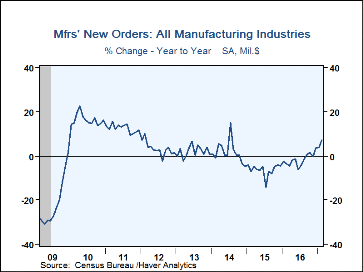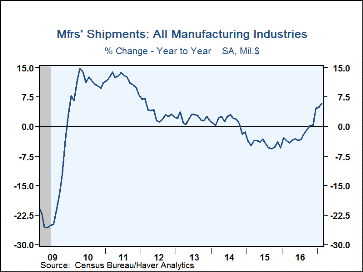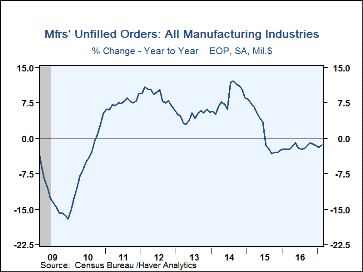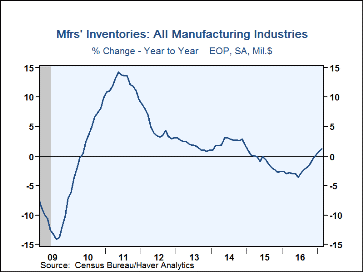 Global| Apr 04 2017
Global| Apr 04 2017U.S. Factory Orders Boosted Again by Durables
by:Tom Moeller
|in:Economy in Brief
Summary
Manufacturing sector orders increased 1.0% (7.3% y/y) during February following a 1.5% January increase, revised from 1.2%. Durable goods orders increased 1.8% (5.3% y/y), revised from the advance report of a 1.7% increase. [...]
Manufacturing sector orders increased 1.0% (7.3% y/y) during February following a 1.5% January increase, revised from 1.2%. Durable goods orders increased 1.8% (5.3% y/y), revised from the advance report of a 1.7% increase. Transportation sector orders gained 4.4% (6.0% y/y) with a jump in nondefense aircraft & parts, but defense aircraft & parts orders eased. Total factory sector orders excluding defense improved 1.2% (6.9% y/y) following a 1.4% gain. Orders outside of the transportation sector gained 0.4% (7.5% y/y). Bookings for computers & electronic products inched 0.1% higher (5.7% y/y). Machinery orders improved 0.3% (5.4% y/y), while electrical equipment orders strengthened 1.9% (2.6% y/y).
Total factory sector shipments gained 0.3% (5.9% y/y), the same as in January. Durable goods shipments improved 0.3% (5.9% y/y). Transportation equipment shipments eased 0.3% (-0.6% y/y), as auto shipments declined 6.4% (-21.3% y/y). Nondefense aircraft shipments fell 4.6% (-4.9% y/y). but defense aircraft & parts shipments increased 10.0% (-1.7% y/y). Shipments of machinery increased 1.1% (2.0% y/y), and computer & electronic product shipments rose 0.1% (6.7% y/y).
Nondurable goods shipments (which equal orders) improved 0.2% (9.2% y/y). Petroleum refinery shipments eased 1.2% (+47.2% y/y). Basic chemical shipments increased 1.1% (3.8% y/y), and textile mill shipments rose 1.3% (6.3% y/y) after four months of strong gains. Food product shipments posted a 0.2% rise (4.2% y/y). Paper product shipments added 0.3% (1.3% y/y).
Unfilled orders remained unchanged (-1.3% y/y), continuing the weak trend of the last year. Transportation sector backlogs eased 0.1% (-3.1% y/y). Outside of the transportation sector, unfilled orders improved 0.3% (2.6% y/y). Electrical equipment & appliance backlogs increased 0.6% (8.9% y/y) and computer & electronic product backlogs rose 0.4% (4.9% y/y). Unfilled orders for machinery improved 0.4% (-2.5% y/y).
Inventories in the factory sector increased 0.2% (1.3% y/y) in February. Outside of the transportation sector, inventories rose 0.2% (2.2% y/y). Durable goods inventories gained 0.2% (-0.1% y/y), but fabricated metals inventories improved 0.4% (0.6% y/y). Machinery inventories rose 0.2% (-0.6% y/y), while inventories of computers & electronic products increased 0.3% (1.4% y/y). Electrical equipment inventories increased 0.4% (1.4% y/y).
The factory sector figures are available in Haver's USECON database.
| Factory Sector- NAICS Classification (%) | Feb | Jan | Dec | Feb Y/Y | 2016 | 2015 | 2014 |
|---|---|---|---|---|---|---|---|
| New Orders | 1.0 | 1.5 | 1.3 | 7.3 | -1.6 | -6.3 | 1.8 |
| Shipments | 0.3 | 0.3 | 2.5 | 5.9 | -1.8 | -4.4 | 1.2 |
| Unfilled Orders | 0.0 | -0.3 | -0.8 | -1.3 | -1.5 | -2.4 | 8.8 |
| Inventories | 0.2 | 0.3 | 0.3 | 1.3 | 0.1 | -2.6 | 1.8 |
Tom Moeller
AuthorMore in Author Profile »Prior to joining Haver Analytics in 2000, Mr. Moeller worked as the Economist at Chancellor Capital Management from 1985 to 1999. There, he developed comprehensive economic forecasts and interpreted economic data for equity and fixed income portfolio managers. Also at Chancellor, Mr. Moeller worked as an equity analyst and was responsible for researching and rating companies in the economically sensitive automobile and housing industries for investment in Chancellor’s equity portfolio. Prior to joining Chancellor, Mr. Moeller was an Economist at Citibank from 1979 to 1984. He also analyzed pricing behavior in the metals industry for the Council on Wage and Price Stability in Washington, D.C. In 1999, Mr. Moeller received the award for most accurate forecast from the Forecasters' Club of New York. From 1990 to 1992 he was President of the New York Association for Business Economists. Mr. Moeller earned an M.B.A. in Finance from Fordham University, where he graduated in 1987. He holds a Bachelor of Arts in Economics from George Washington University.
More Economy in Brief
 Global| Feb 05 2026
Global| Feb 05 2026Charts of the Week: Balanced Policy, Resilient Data and AI Narratives
by:Andrew Cates










